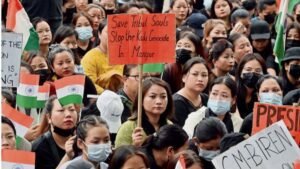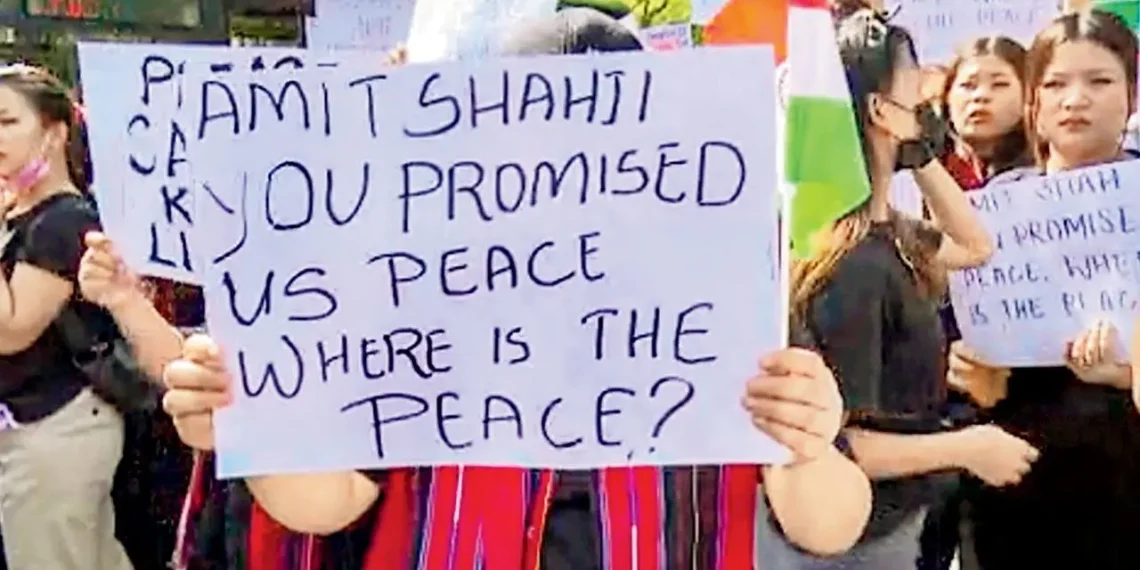Editor’s Note: As part of our commitment to serve as an advocacy platform for peace in Manipur, we continue to welcome “opinion” articles from all communities. We encourage individuals to use this space to express their perspectives with sincerity and responsibility. We urge contributors to refrain from language that could be interpreted as inciting violence or hatred. In line with this initiative, we present a write-up by HS Benajamin Mate, the chairman of Kuki Organisation for Human right Trust (KOHUR). Please mail your write-up at: novinkn@gmail.com. Thank you, Navin Upadhyay
BY HS Benjamin Mate
In the troubled landscape of Manipur, a state nestled in India’s northeast, the Kuki community finds itself under siege—politically marginalized, historically overlooked, and now violently targeted. While India celebrates its democratic values and diversity, the Kuki people continue to face an existential threat that has gone largely unrecognized by the national mainstream.
Historically, the Kukis have stood firmly with the Indian Union. They fought valiantly in the Anglo-Kuki War of 1917–1919 against British colonial forces and contributed to the Indian National Army during the country’s freedom struggle. Their loyalty to India has remained steadfast, even as other communities in Manipur, particularly armed factions within the Meitei and Naga groups, have pursued separatist agendas.
Yet this loyalty has not shielded the Kukis from systemic violence. Since the early 1990s, they have endured waves of ethnic cleansing at the hands of militant groups. Between 1992 and 1997, Naga militants reportedly destroyed over 300 Kuki villages and killed more than 1,000 civilians. More recently, since May 2023, over 200 Kukis have been killed and thousands displaced due to escalating violence perpetrated by Meitei armed groups.
READ: Mizoram to Launch Myanmar Refugee Portal After Shah’s Nod
The scale and brutality of this violence are staggering. Groups such as the United National Liberation Front (UNLF), the People’s Liberation Army (PLA), and Arambai Tenggol have not only targeted civilians but also engaged in attacks against Indian security forces, extortion, and even the recruitment of child soldiers. Some of these groups reportedly have links with Chinese intelligence and Maoist insurgents, compounding national security concerns.

In stark contrast, the Kukis have remained aligned with the Indian state, seeking justice and autonomy through democratic means. But they are now asking a fundamental question: How long can a people be loyal to a state that cannot protect them?
The time has come for the Government of India to take decisive and restorative action. The creation of a Union Territory for the Kuki community is not merely a demand for autonomy—it is a plea for survival. A Union Territory would allow the central government to administer the region directly, bypassing biased state mechanisms that have failed to ensure the safety of its own citizens. It would offer a framework for justice, infrastructure development, and the rebuilding of shattered lives.
READ: L’Affair Tej Pratap Yadav: Love, Loyalty, or Sibling Rivalry?
Opponents of this idea may argue that such a move risks balkanizing the state or encouraging separatism. But the reality is this: the Kuki community is not seeking secession; it is seeking safety and recognition within the Indian Union. A Union Territory status would be a reaffirmation of the Constitution’s promise to protect all its citizens, regardless of ethnicity or geography.
India has previously responded to ethnic and regional conflicts by reorganizing territories—consider the formation of states like Jharkhand and Telangana, or Union Territories like Ladakh. The Kuki case deserves similar constitutional compassion and clarity.
This is not only about justice for the Kukis—it is about reaffirming India’s democratic character. To ignore their suffering is to send a dangerous message: that loyalty to the Indian state offers no guarantees of protection or political inclusion.
As violence continues to fester in Manipur, silence is complicity. The Kukis are not calling for war. They are calling for a voice, for safety, for dignity. It is time we listened.
HS Benajamin Mate is the chairman of Kuki Organisation for Human right Trust (KOHUR). he can be approached at: benjaminmate@gmail.com














